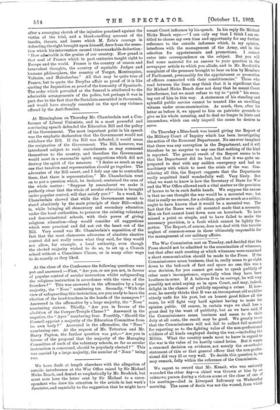The War Commission met on Tuesday, and decided that the
Press should not be admitted to the examination of witnesses, but that after each meeting at which witnesses were examined a short communication should be made to the Press. If the Commissioners mean business, that is, really mean to go right down to the bed-rock of fact and spare no one, this was a wise decision, for you cannot get men to speak publicly of other men's incompetence, especially when they have been brothers-in-arms. If A believes B to be corrupt, he will very possibly not mind saying so in open Court, and may, indeed, delight in the chance of publicly exposing a crime. If, how- ever, he merely thinks that B was an incompetent old muddler utterly unfit for his post, but an honest good fellow all the same, he will fight very hard against having to make his opinion public. Of course, in certain ways we shall lose a great deal by the want of publicity, but as we have said, if the Commissioners mean business and mean to do their duty at all costs, the result may be good. We greatly trust that the Commissioners will not fail to collect full material for reporting as to the fighting value of the non-professional soldiers of all kinds employed during the war,—including the Militia. What the country needs most to know in regard to the war is the value of its hastily raised levies. But it wants a reasoned decision on evidence, not merely the ez-cathedri statement of this or that general officer that the non-profes- sional did very ill or very well. To decide this question is, we may remark, fully within the reference of the Commission.










































 Previous page
Previous page